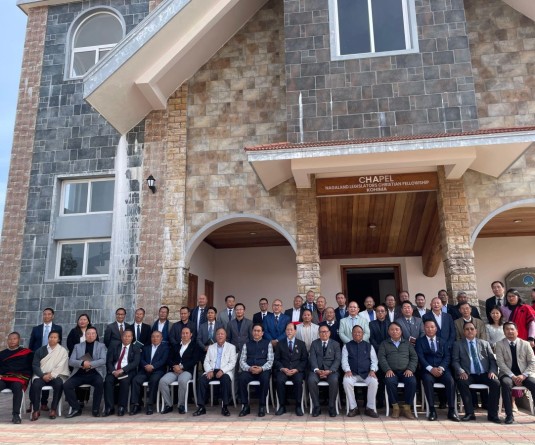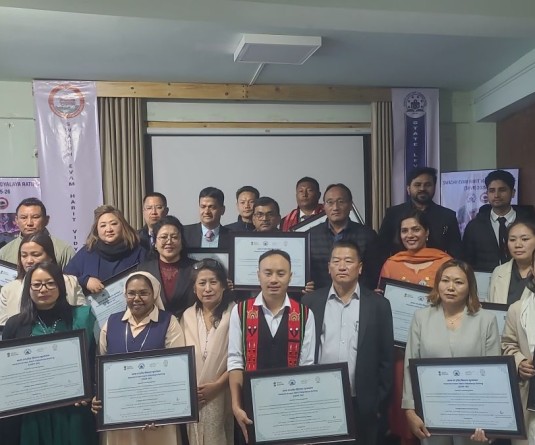.jpg)
COVID-19 impact on newspaper industry in Nagaland- Part II
Ashikho Pfuzhe
Dimapur | August 7
Media organizations across the globe depend on the income generated through its circulation and advertisements. With the dwindling economy due to the COVID-19 pandemic, newspaper offices in Nagaland are also going through a great share of struggle as it has adversely affected its income generating activities. Times are really grim for the media houses and one of the adding factors has been the delay in payment of government advertisement bills.
‘Government baki’
As for government departments, Editor, Publisher and Proprietor of Nagaland Page, Monalisa Changkija said there is so much to say but they (government departments) seem to have deaf ears and that they don’t seem to be aware that a smooth flow of cash is vital for the newspaper industry.
“How much can we function on baki? So by the time we get the delayed payments from Government Departments, including Centrally-Sponsored Schemes, and we pay the bakis, we are back to square one and the cycle of bakis continues,” she said.
The Nagaland Page Editor also argued that in any case, small-sized papers like Nagaland Page, Tir Yim Yim, Capi, etc., hardly get as much advertisements from the State Government Departments. She pointed out that some two weeks back, the NHM and the Health Department did not issue advertisements to small-sized papers but advertised only in the big-sized papers.
“It could also be because we have always been very critical of Governments, whichever political party, especially now since we are very critical of the way our state Government and particularly the Health and Family Welfare Department, is handling the pandemic here. So, you see, we are here also dealing with biasness, discrimination and partiality by the Government Departments. And the irony is that they have no problems giving us their press releases for ‘wide circulation’,” she said.
Editor, Tir Yimyim (Ao vernacular), K Temjen Jamir said, “Despite our best efforts against all odds, we get less revenue from government advertisements. Many departments under the State Government have separate budget allocation for media to educate and disseminate information to the public relating to various policies and programs of both the central and state governments. However, we don't receive much of such publicity materials for publications as advertisement.”
As a result, Jamir said people are not made aware about various government programs meant for them and at the same time newspapers are also deprived of their due share of revenue. He said government departments must use newspapers instead of booklets, tracks and bill boards as agents of government programs and policies to reach out to the mass, preferably in their own mother languages, so that they can understand, especially in a multilingual society like Nagaland.
Editor, Capi (Angami vernacular), Mhalezolie Kire was of the view that government departments should try to cut down on the disparity with regard to advertisements issued to various newspapers in the state. Kire said the government must keep in mind that not only English newspapers but vernacular papers play an equal responsibility in spreading the policies and programmes of the government in the nooks and corners of the state.
Stimulus package
The Nagaland Page Editor informed that almost two months ago, Nagaland newspapers had written to the State Government to clear the backlog of advertisement payments till April 2020.
“We have yet to hear from the Government. In the same letter, we had also requested the state Government to give a stimulus package to our newspapers to enable us to tide over the financial crunch we are facing due to the pandemic, the lockdown and consequences thereof,” she informed.
She stated that it is understandable if the Government cannot provide the newspapers with a stimulus package immediately as many other sectors are asking for the same.
“But the difference here is that we have not laid-off our staff and/or reduced their salaries. We are still paying them as before although our machine room people are not working. But most importantly, the Government needs the newspapers to keep the line of communication open between it and the people, particularly at this time of the pandemic,” she added.
Monalisa stated that if newspapers were to fold up, it would gravely affect the Government’s communication channel with the people. Newspapers are also the main platform for the public to air their opinions, views, grievances, etc., to communicate with the Government.
“Without newspapers, our people would be rendered voiceless. So, the Government must, at least, clear the backlog of payments it owes to the newspapers and seriously consider a stimulus package for Nagaland newspapers at the earliest,” she stated.
This is the second of a three part series
Read Here:
Can print media survive the pandemic? - COVID-19 impact on newspaper industry in Nagaland- Part I






